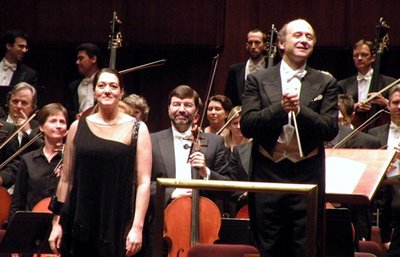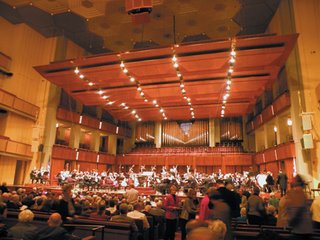Seeing Mozart’s Idomeneo and Mussorgsky’s Boris Godunov back-to-back at the San Francisco Opera on the evenings of October 21 and 22, I did not expect to be struck by the similarity of their themes. What could this Enlightenment opera, penned in Munich in 1781, have to do with the darkness and gloom of unenlightened czarist Russia of 1869?
More than you might think. Both operas deal with the perennial issue of the order of the soul and the order of the city. Both operas ask the central questions: what is the ruler’s relationship to the divine and what difference does that relationship make to his rule; and what is the relationship between the moral character of the ruler and the political order? Not surprisingly – since the family is the foundation of the polis – both operas also deal with families and the relationships within them.
I was left to dwell upon these themes because the excellence of both productions left me free to plumb the meaning of the operas themselves. There were no distractions from poor production values, bad casting, awkward acting, or flubbed notes. More will be said about the obverse of each of these, but the main point is that both evenings were opera at its finest – as one has come to expect of the San Francisco Opera.
Although I am a Mozart fanatic, Idomeneo remains relatively unknown to me. In fact, it was pretty much unknown to everyone from the time of its last performance in 1781 until some point in the 19th century. San Francisco didn’t see its first production of Idomeneo until 1977; the current production was first offered in here in 1989.
For those used to the teeming life in Don Giovanni and The Marriage of Figaro, the reasons for Idomeneo’s neglect are fairly easy to divine. In the vein of opera seria, Idomeneo is a somewhat heavy classical drama based upon the fictional story of Idomeneo returning from the Greek conquest of Troy. He almost perishes at sea, but is saved by his vow to Neptune to sacrifice the first person he sees on land. That person turns out to be his son Idamante (a part written for a castrato that is now sung by a mezzo-soprano).
Thus the dramatic tension in the opera is centered on whether or not Idomeneo will kill his son. If he does not, will the gods destroy Crete? That sounds exciting but, in fact, most of the major action takes place off stage – the ship wreck, the storm, the monster’s attack on Crete, and Idamante’s slaying of the monster – we are only told about these events. Instead, the characters mostly soliloquize over the dire situations in which they find themselves. In other words, most of the drama is interior. This makes the on-stage action static. The poor director (John Copley) is left having the characters occasionally lurch in one direction or another to express the profundity of their emotions. It is hard to imagine what else he could do – although it would be a director’s job to figure exactly that out. Nonetheless, this is already mature Mozart, and it is so musically rich and sophisticated that one can only be pleased that it has made its rather late entry into the repertoire.
Back to the story: Idomeneo immediately regrets his terrible vow, but seems to have been placed in this situation because he was willing to sacrifice someone else’s life for his own. The tension this sets up is only resolved when others prove willing to sacrifice themselves, rather than see Idamante slain. In a marvelous scene in Act III, Idomeneo realizes his culpability, “I alone sinned,” and offers his own life for his son’s. Idamante, in turn, is clearly willing to give his life to save the people of Crete as he goes out to slay the monster (whose destructive presence seems the embodiment of the dislocation in the relationship between the gods and man). Then Idamante announces that he is ready for Idomeneo to take his life as the necessary sacrifice. Ilia, King Priam’s daughter, who is in love with Idamante, intervenes and offers her life in his place.
With this, the spell of Idomeneo’s vow is broken and Neptune relents. The disembodied Voice proclaims: “Love has triumphed.” However, Idomeneo has forfeited his right to rule. By offering to sacrifice someone else in his stead, he dislocated his relationship with his own son – thereby suggesting that it was wrong to offer anyone in his place. He has lost his legitimacy. Idamante replaces him as king. Thus, order is restored. The legitimacy of the new order, sanctioned by the gods in a presage of Christian kingship, is established by the ruler’s willingness to self-sacrifice. This does not strike me so much as an Enlightenment message as a Christian one.
It would be difficult to praise the orchestra and its conductor, Donald Runnicles, too highly. I would be tempted to call them the stars of the evening were it not for the vocal excellence on display. The playing was echt Mozartian – alert, highly nuanced, especially in the winds and strings, vivacious, lyrical and dramatic as the moment required.
Alice Coote, the British mezzo-soprano, was a standout in the key role of Idamante, which she not only sang well but acted with unflagging concentration and conviction. She was beautifully matched by the Austrian singer Genia Kuhmeier, a completely believable Ilia, who looked and sang just as a Mozartian soprano should. Kurt Streit has a well-deserved reputation for this role as Idomeneo. His anguish and anger at Neptune were completely convincing. Alek Shrader as Abace stood as a peer with the principals, though he is only 25 years old – about the age of Mozart when the opera was finished. Iano Tamar as Elettra sang expressively of her unrequited love for Idamante. Hers is not a big voice, however, and she was swamped in the third act quartet.
There is a good deal of great choral music in Idomeneo and the chorus excelled. Design-wise, the set and costumes emulated the 18th century and how the 18th century might have conceived of ancient Greece. The mix worked well. The set was suitably archaic looking, with fragments of classical pediments strewn about. The scene of the ruins from the monster’s depredations had a delicious hint of Italian futurism about it. In short, the production was a success that in many ways transcended the limitations of the stilted opera seria genre.
Boris Godunov offers another troubled ruler. At the beginning of his reign as tsar, Boris prays, “may I be good and just like Thee.” This does not appear, however, to be something God can grant or Boris’s conscience allow – because his reign is based upon an act of murder. Unlike Idomeneo, who was only willing to sacrifice someone for himself, Boris actually did so in having the Tsarevich Dimitri killed so that he, Boris, could rule. The consequences of this horrible deed are played out in this original 1869 version of Mussorgsky’s opera.
This is one of the truly great portraits of a tortured soul. It is made all the more moving because Boris actually tries to be a good ruler and a good father to his son Fyodor and his daughter Xenia. All is for naught. The opera teaches that regime change cannot be based upon regicide. Boris’s act inevitably gives rise to a pretender, Grigory, a renegade monk who tries to pass himself off as Dimitri, who had been killed 12 years earlier at the age of 7. The appearance of the pretender intensifies Boris’s anguish to the point that he begins to hallucinate; the murdered child appears to him in one of the great ghost scenes of opera. “Oh cruel conscience, too savagely you punish me,” cries out Boris.
Before Boris goes mad, he delivers a prayer for “my innocent children.” That this scene and its music can bring tears to one’s eyes is a measure of Mussorgsky’s achievement in presenting the full scope of Boris’s tragedy by showing Boris in his full, though flawed humanity. In counseling his son, he sings, “Keep your conscience clear for it will be your power and strength.” In other words, no one realizes better than Boris that the good order of the ruler’s soul is the foundation of his political strength.
I have not seen Samuel Ramey since he sang Mefistofele 20 years ago at the SF Opera. He was still a young man then. Now he is 66 years old. It seemed to tell a bit in the coronation scene when his voice wobbled a bit. However, that was the only hint, for he had no trouble rising to the big scenes or in delivering a truly searing and terribly moving portrayal of Boris. He has a tremendous sense of stage presence, and his nuanced portrait of the increasing toll Boris’s conscience takes on him was haunting. From the point at which Prince Shuisky tells him of the pretender through to Boris’s death, Ramey was riveting. He played the prayer scene with heartbreaking authenticity. The scene in which the holy fool refuses to pray for Boris because he is “Tsar Herod” was joltingly effective.
The rest of the principals were outstanding as well. John Uhlenhopp as Prince Shuisky was the incarnation of unctuous treachery. Vsevolod Grivnov was superb as Grigory, the pretender, with almost a nasal whine in his voice from envy. Russian bass Vladimir Ognovenko almost stole the show with his performance as Varlaam, the vagabond monk. I was not surprised to see in his bio that he has sung Boris.
The set was stark simplicity itself – a raked stage that wraps up in the rear to the ceiling, and out of which doors opened for various entrances and exits. The gray setting put everything else in high relief. It made the appearance of the icons and rich court costumes in the coronation scene all the more impressive. In a nice touch of irony, Boris was dressed in shocking white. The general darkness and lighting were entirely appropriate to the interior drama that was being played out. The orchestra and chorus once again covered themselves in glory, this time under Russian conductor Vassily Sinaisky.
It seems there is no escaping the connection between the order of the soul and the order of the city. As good a reminder for why we go to the opera, as it is a guide for our own lives.
(Idomeneo plays again on October 28th and 31st, Boris on October 30th, November 2nd, 4th, 7th, 12th, and 15th.)
Robert R. Reilly
Labels: opera, review

 I have often visited the Kennedy Center and I continue to be impressed by its prime location on the Potomac alongside some of the best-known presidential memorials, its architectural beauty and its wonderful acoustics. I can still recall the sounds of the Berlin Philharmonic under Karajan and the Vienna Philharmonic under Bernstein in this remarkable hall. On the strength of the Mahler Third Symphony performance I heard, Ivan Fischer and the National Symphony belong in that distinguished company.
I have often visited the Kennedy Center and I continue to be impressed by its prime location on the Potomac alongside some of the best-known presidential memorials, its architectural beauty and its wonderful acoustics. I can still recall the sounds of the Berlin Philharmonic under Karajan and the Vienna Philharmonic under Bernstein in this remarkable hall. On the strength of the Mahler Third Symphony performance I heard, Ivan Fischer and the National Symphony belong in that distinguished company. Wikipedia
Wikipedia Naida Cole website
Naida Cole website


